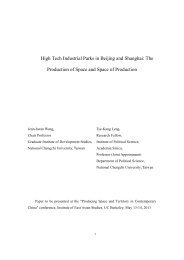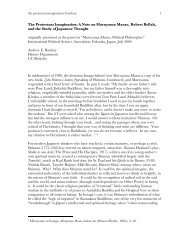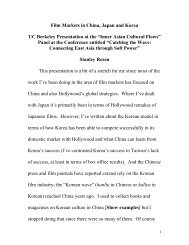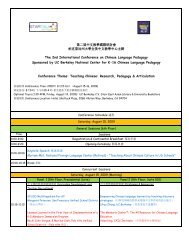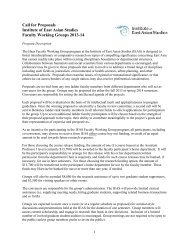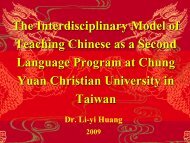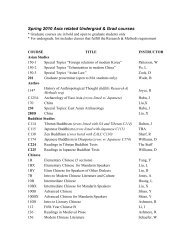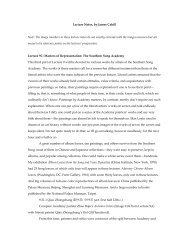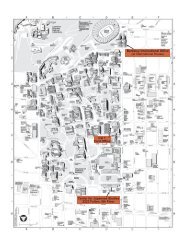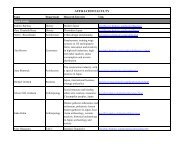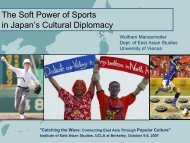Third Edition Spring 2013 - Institute of East Asian Studies, UC ...
Third Edition Spring 2013 - Institute of East Asian Studies, UC ...
Third Edition Spring 2013 - Institute of East Asian Studies, UC ...
You also want an ePaper? Increase the reach of your titles
YUMPU automatically turns print PDFs into web optimized ePapers that Google loves.
modes <strong>of</strong> culture production I will demonstrate how photographshave served to construct cultural memory. It is through this constructedcultural memory that a heroic Vietnamese national identityhas been constructed and exploited in Vietnam’s political sphereboth in the past as well as the present.It is important to understand that there is a definite tensionbetween the uses <strong>of</strong> the past as a legitimizing device, as a means<strong>of</strong> constructing community, as well as its repackaging as a marketablecommodity. 1 Thus, the struggle over the past is an aspect <strong>of</strong>control over the future. Photography in Vietnam serves to reflectthese tensions in the nation <strong>of</strong> Vietnam. The relationship betweenphotography and the nation had not been substantially developeduntil 1945 and not fully realized until the Vietnam War. 2 From theVietnam War to present day, photography has served as a socialmirror reflecting an image to the nation’s inhabitants. The “imagein the mirror” comes from memory, more specifically culturalmemory. This memory is constructed through re-writing the pastto reflect the interests <strong>of</strong> those in power. To understand how thisfeat is accomplished it is important to understand memory andmore importantly, memory’s relationship to identity.Cultural Memory and National IdentityMemory establishes life’s continuity; it gives meaning to thepresent, as each moment is constituted by the past. As the means bywhich we remember who we are, memory provides the very core<strong>of</strong> identity. 3 This understanding <strong>of</strong> memory can be extended to answerbigger questions <strong>of</strong> what it means for a nation to rememberand the importance <strong>of</strong> constructing cultural memory. A nation’smemory <strong>of</strong> what their culture is can <strong>of</strong>ten appear similar to that <strong>of</strong>an individual. Memory serves as a tool for an individual to shape1 Tai, Hue-Tam Ho. The Country <strong>of</strong> Memory: Remaking the past in Late SocialistVietnam. Berkeley: University <strong>of</strong> California, 2001.2 Lê, Phức, and Thành, Chi. Ảnh Việt Nam Thế Kỷ XX = Vietnamese Photographyin the 20th Century = La Photographie Du Vietnam Au 20e Siècle. Hà Nội: Nhà Xuất BảnVăn Hoá Thông Tin, 2002.3 Sturken, Marita. Tangled Memories: The Vietnam War, the AIDS Epidemic, andthe Politics <strong>of</strong> Remembering. Berkeley: University <strong>of</strong> California, 1997.their identity and remember “who they are,” and in this way a collectivecultural memory serve to shape the identity <strong>of</strong> a nation. Thedevelopment <strong>of</strong> cultural memory is complex because it is boundto various political stakes and meanings. Cultural memory servesto both define culture and is the means by which its divisions andconflicting agendas are revealed. 4To define memory as culture is, in effect, to enter into a debateabout what that memory means because the cultural memoryprocess does not efface an individual, but rather involves the interaction<strong>of</strong> individuals in the creation <strong>of</strong> cultural meaning. 5 Culturalmemory is a field <strong>of</strong> cultural negotiation through which differentstories vie for a place in history. To summarize, the term “culturalmemory” is to be understood as a memory that is shared outsidethe avenues <strong>of</strong> formal historical discourse yet is entangled with culturalproducts and imbued with cultural meaning. 6 Cultural memoryis produced in various forms, such as memorials, public art, popularculture literature, commodities, and activism. Understandinghow individual memory leads to a collective cultural memory allowsfor the significance <strong>of</strong> cultural memory to be ascertained.Importance <strong>of</strong> Memory in PoliticsMemory is a political force. Foucault asserts that “sincememory is actually a very important factor in struggle, if one controlspeople’s memory, one controls their dynamism.” Culturalmemory draws its significance from the ability to serve as a core <strong>of</strong>identity for a nation and political force that a core identity carrieswith it. Identity is an important political tool because leaders useidentity to legitimize their questionable agendas in multiculturalcountries, to further undermine opposing voices, and to marginalizediffering opinions. The process whereby identities becomepoliticized as well as mobilized are in wars and their many differentrepresentational contexts (i.e. monuments, etc.), in order to4 Ibid.5 Ibid.6 Ibid27 Mark Portillo Constructing “Culture” 28



